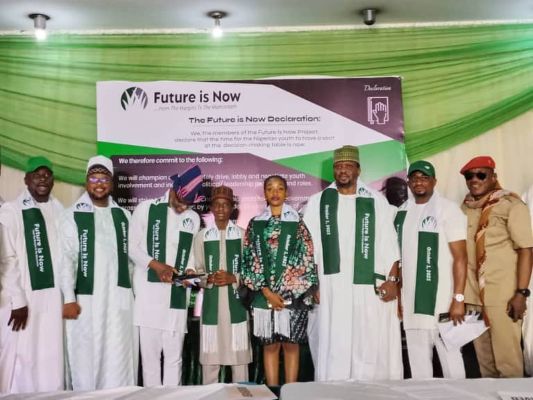Nigeria’s youth are ready to lead
For decades, Nigerian youths have campaigned, voted, and thrown their weight behind older politicians — yet leadership positions have remained stubbornly out of reach.
After years of exclusion and missed opportunities, a new generation of young Nigerians is stepping forward, determined to shape the nation’s destiny.
Armed with education, creativity, and an unyielding spirit, they are ready to confront Nigeria’s biggest challenges — from corruption and unemployment to insecurity and inequality. No longer content to stand on the sidelines, they are turning ideas into action and ambition into measurable progress.
The future is now
During Nigeria’s 65th Independence Anniversary, a bold gathering of young leaders in Abuja sent a powerful message: the future is not tomorrow — it is now.
At the launch of the Future Is Now Project held at Nicon Luxury Hotel, youth delegates, civil society leaders, and public officials called for a radical shift in Nigeria’s political landscape. Their message was clear — after decades of marginalisation, the country’s largest demographic must take its rightful place in governance.
“For too long, Nigerian youths have been excluded from decision-making. That era must end,” declared Rep. Abdussamad Dasuki, Interim Chairman of the Project. “This is not just a project; it is a movement powered by the hopes, energy, and determination of millions of young Nigerians.”
Dasuki, who represents Kebbe/Tambuwal Federal Constituency and chairs the House Committee on Marine and Blue Economy/Shipping Services, stressed that the initiative cuts across political lines. “This is about inclusion and progress. Anyone who believes in that vision is welcome to join us,” he said.
“Today,” he added, “we are not merely launching a project — we are igniting a movement. One born of sacrifice, fueled by courage and conviction, and sustained by the dreams of millions of young Nigerians. The future is not tomorrow; the future is now.”
A call for generational leadership
Project Convener Laolu Akande, a former presidential aide, outlined ambitious targets ahead of the 2027 elections. The movement envisions that at least 70 percent of local government and state assembly seats will be held by youths under 35, and that a similar proportion of House of Representatives seats will be contested and won by those under 40. It also advocates that no less than 50 percent of executive appointments at both federal and state levels should go to Nigerians under 40.
“Too often, young people are denied the opportunity to contest elections or hold leadership positions,” Dasuki noted. “It is alarming that in our democracy, youths continue to be overlooked.”
With a population of nearly 230 million, approximately 70 per cent — or roughly 160 million people — are young. Yet their representation in governance remains strikingly low. “The time has come,” Dasuki declared, “for young Nigerians to rise and lead the change.”
Youth leadership as a catalyst for progress
The Future Is Now Project aims to harness the creativity, innovation, and energy of young Nigerians to drive effective governance. Across sectors — from tech startups to social enterprises — young people are already transforming society. By providing them with political platforms, the movement aims to translate this momentum into policies that foster economic growth, job creation, and national development.
The initiative also places strong emphasis on accountability and transparency. Young leaders are encouraged to base decisions on evidence, lead with integrity, and prove that youth-led governance can be both effective and transformative.
Collaboration is at the heart of the project’s vision. Delegates underscored the importance of working with civil society organizations, the private sector, and experienced politicians to address pressing national issues — including insecurity, inequality, and climate change. By fostering civic engagement, the project seeks to nurture a generation of leaders who are visionary yet grounded in practical realities.
The youth speak
From Sokoto sto Calabar, Kano to Port Harcourt, young Nigerians expressed frustration with a political system that recycles the old guard while marginalizing emerging leaders.
“We’ve waited long enough,” said Amina Suleiman, a youth leader from Kano. “We’re no longer satisfied being campaigners or aides. We want to lead and make a real difference.”
Daniel Ekanem from Cross River State described the movement as “a generational handshake” — symbolizing collaboration between older and younger politicians.
Across the country, youth leaders echoed the same sentiment: this is a unifying movement that transcends ethnicity, religion, and party politics.
“For the first time, young Nigerians are speaking with one voice,” said Anas Dukura, a youth activist from Sokoto currently based in London. “We have the courage and determination to fix what isn’t working. We are ready to lead — and we fully support the Future Is Now Project.”
Respecting the elders
At the unveiling, delegates paid heartfelt tribute to Nigeria’s elder statesmen and women, acknowledging their foundational roles in nation-building. Yet they also appealed to the older generation to graciously make room for emerging leaders — positioning themselves as mentors to ensure a smooth, sustainable transition of power.
“This is not rebellion,” said Rep. Abdussamad Dasuki. “It is renewal. We need the wisdom and guidance of our elders as we take responsibility for the next chapter in Nigeria’s journey.”
Abubakar writes from Kano. He can be reached at isaabubakar@yahoo.com


